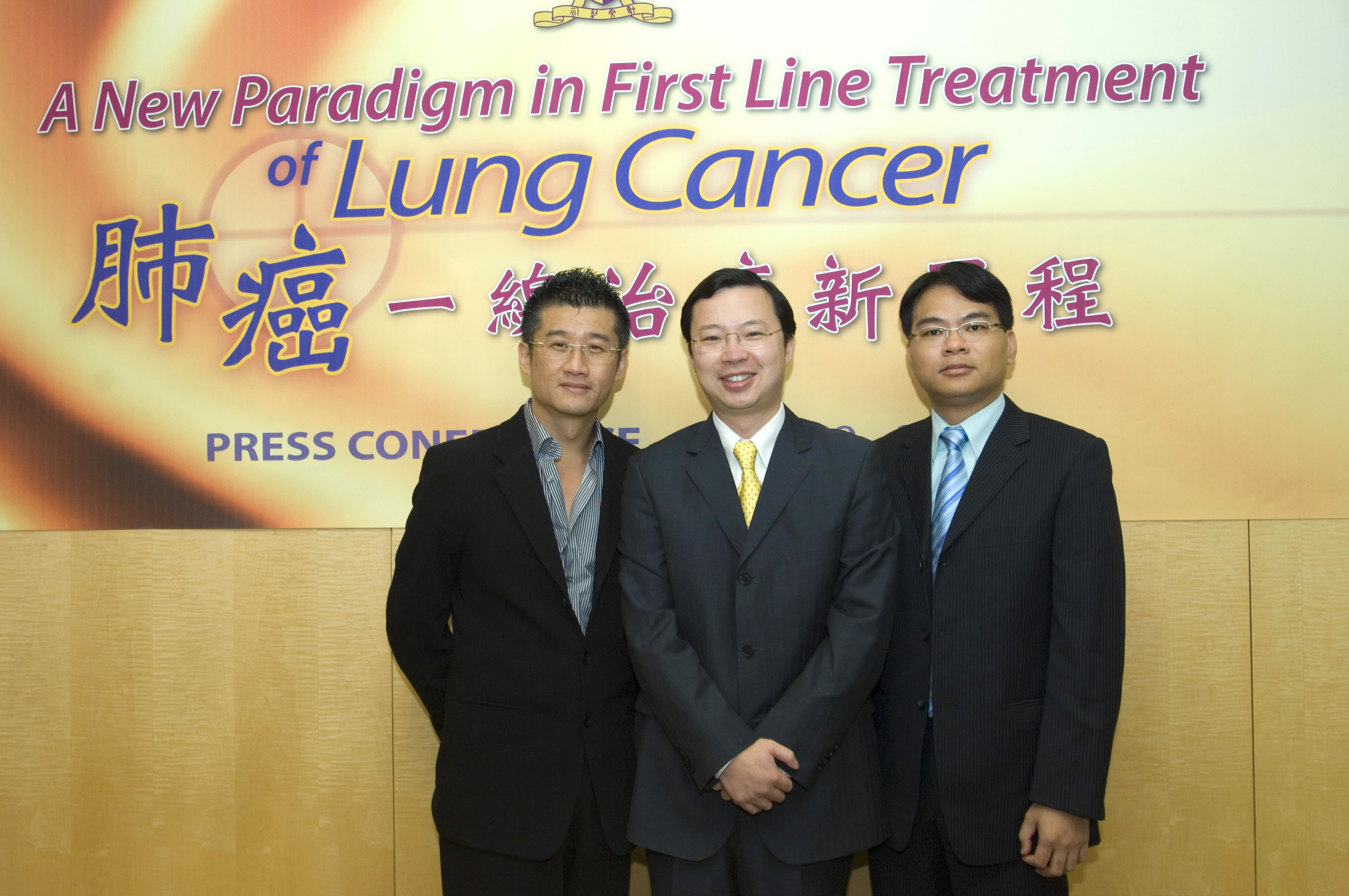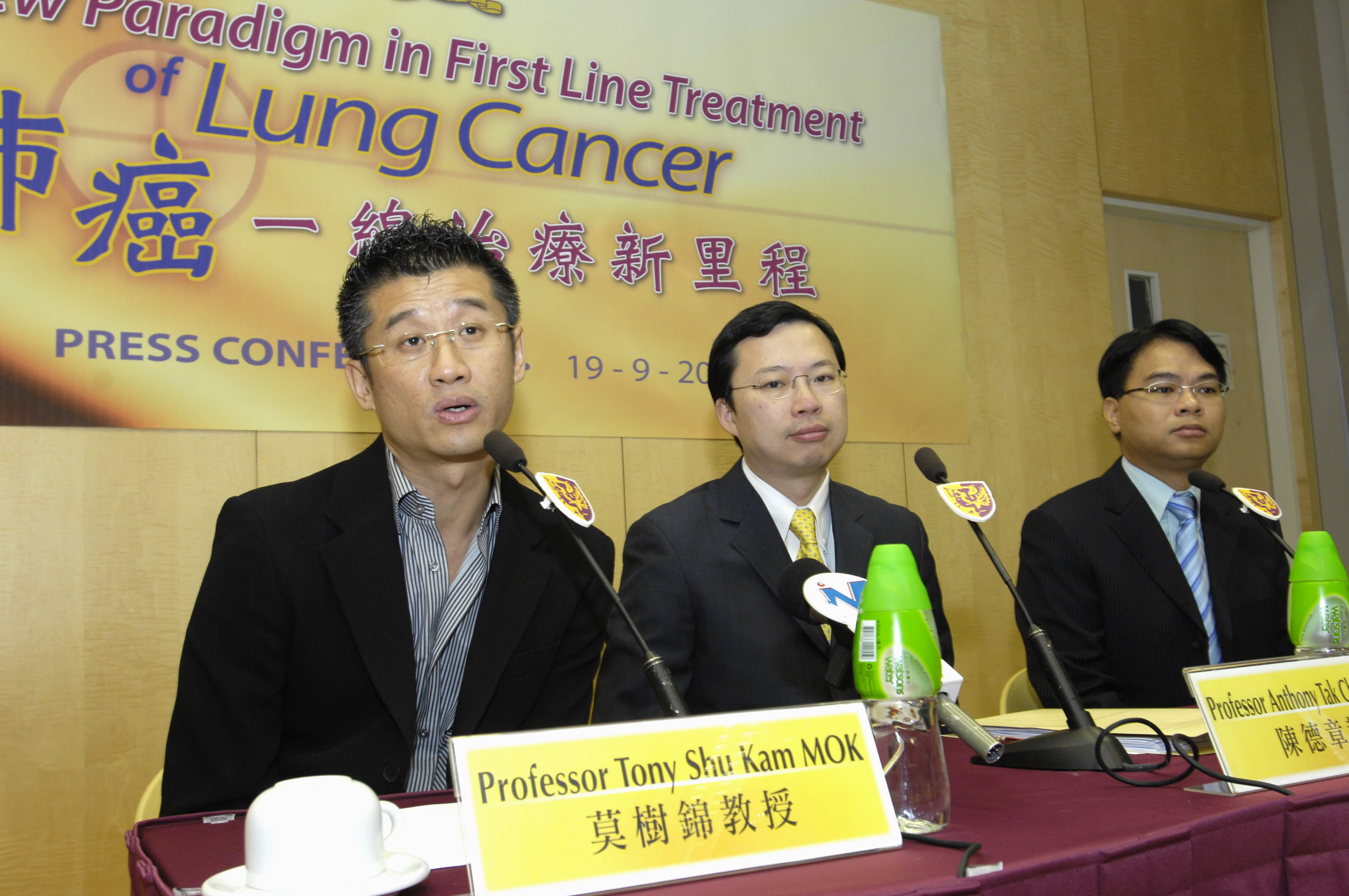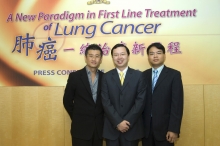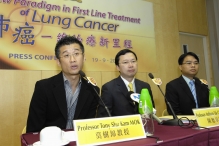CUHK
News Centre
A New Paradigm in First Line Treatment of Lung Cancer
Lung cancer, accounting for 21% of all newly diagnosed cancer and 30% of all cancer deaths, is the most common cancer in Hong Kong. About 4,000 new cases of lung cancer were diagnosed in 2007 and close to 3,500 died from the illness. The incidence of lung cancer in Hong Kong is ranked as the highest among the developed cities in Asia. Cigarette smoking, the major cause of lung cancer, is still on the rise in Hong Kong and Asia. The incidence of lung cancer is anticipated to remain high.
About 60% of all lung cancer cases are presented at advanced stage. Current standard first line therapy, meaning the treatment at initial diagnosis, is a two-drug combination chemotherapy that includes cisplatin or carboplatin. Common side effects may include hair loss, nausea, vomiting, weakness, infection and bone marrow suppression. Although the new generation of chemotherapy has a much improved toxicity profile, many patients would want to avoid the adverse effect.
Epidermal growth factor receptor tyrosine kinase inhibitors (EGFR TKI), including gefitinib (Iressa) and erlnotinib (Tarceva), are a novel oral targeting therapy that can control cancer growth, with a much improved toxicity profile. The drugs have been established to be a second line therapy, meaning to be used after chemotherapy-failure, but their role as first line therapy remains to be defined.
Since 2006, Professor Tony Mok from the Department of Clinical Oncology at The Chinese University of Hong Kong (CUHK) has been leading the largest comparative lung cancer study in Asia that determines the role of gefitinib as first line therapy. IPASS (IRESSA Pan-ASia Study) was an open label, randomised, parallel-group study that assessed the efficacy, safety and tolerability of gefitinib versus carboplatin/paclitaxel as first line treatment in a clinically selected population of patients from Asia. The primary endpoint of IPASS was progression-free survival (PFS), with the objective of demonstrating that gefitinib was non-inferior to carboplatin/paclitaxel doublet chemotherapy. The study enrolled 1,217 patients in Asia with advanced NSCLC who had not received prior chemotherapy, whose tumours were adenocarcinoma histology and who had either never smoked, or were former light smokers (ceased smoking at least 15 years ago or low exposure with less than 10 packs per year). About 50% of the study population is from China, 20% from Japan and 30% from the rest of Asia.
On 15 September, Professor Tony Mok presented the data at the Presidential Symposium at European Society of Medical Oncology (ESMO) meeting in Stockholm. He showed that IPASS exceeded its primary objective, demonstrating superior PFS and higher tumour response for the oral anti-cancer drug gefitinib, compared with intravenous carboplatin/paclitaxel chemotherapy in the overall population of clinically selected patients with advanced NSCLC in Asia.
In pre-planned analyses of subgroups defined by the biomarker status of the patient’s tumour, PFS was significantly longer for gefitinib than chemotherapy in patients with EGFR mutation positive tumours, and significantly longer for chemotherapy than gefitinib in patients with EGFR mutation negative tumours.
Gefitinib also demonstrated a more favourable tolerability profile and superior quality of life improvement rates for patients versus chemotherapy. Lead Investigator of IPASS, Professor Tony Mok said, “Results from the IPASS study offer a new paradigm in first line treatment of advanced NSCLC. Patients with adenocarcinoma who are either non or light smokers can now choose gefitinib (a single oral tablet once daily) over chemotherapy, and expect the benefit of longer progression free survival, higher tumor response, less toxicity and better quality of life.”
(From left) Professor Tony SK MOK, Professor, Department of Clinical Oncology, CUHK Professor Anthony TC CHAN, Director, Hong Kong Cancer Institute & Sir Y.K. Pao Centre for Cancer, CUHK; Professor of Clinical Oncology, CUHK Professor KC LAM, Clinical Assistant Professor (Honorary), Department of Clinical Oncology, CUHK







